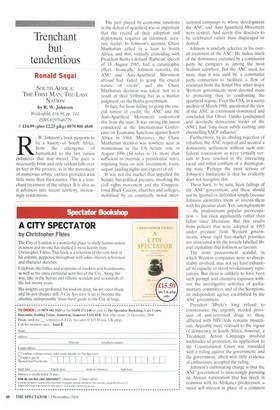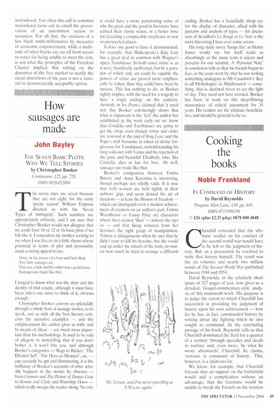Trenchant but tendentious
Ronald Segal
SOUTH AFRICA: THE FIRST MAN, THE LAST NATION by R. W. Johnson
Weidenfeld, £16.99, pp. 241, ISBN 0297646729
(t) £14.99 (plus £2.25 p&p) 0870 800 4848 R. W. Johnson's book purports to be a history of South Africa, from the emergence of humankind to the last nation (whatever that may mean). The pace is necessarily brisk and only seldom falls over its feet in the process, as in the movement of numerous ethnic entities provided with little more than their names. This is a trenchant treatment of the subject. It is also, as it advances into recent territory, increasingly tendentious.
The part played by economic sanctions in the defeat of apartheid was so important that the record of their adoption and deployment requires an informed, accurate recital. In Johnson's account, Chase Manhattan called in a loan to South Africa, and this, virtually coinciding with President Botha's defiant 'Rubicon' speech of 15 August 1985, had a catastrophic effect. 'Ironically,' Johnson remarks, the ANC and Anti-Apartheid Movement abroad had 'failed to grasp the crucial nature of credit'; and the Chase Manhattan decision was taken not as a result of their lobbying but as a market judgment' on the Botha government.
In fact, far from failing to grasp the crucial nature of credit, the ANC and the Anti-Apartheid Movement understood this from the start. It was among the issues considered at the International Conference on Economic Sanctions against South Africa in 1964. Moreover, the Chase Manhattan decision was nowhere near as momentous as the US Senate vote in August 1986 (84 votes to 14, more than sufficient to override a presidential veto), imposing bans on new investment, loans, airport landing rights and exports of oil.
It was not the market that impelled the Senate, but political pressure, involving the civil rights movement and the Congressional Black Caucus, churches and colleges, mobilised by an essentially moral inter national campaign to whose development the ANC and Anti-Apartheid Movement were central. And surely this deserves to be celebrated rather than disparaged or denied.
Johnson is similarly selective in his overall treatment of the ANC. He makes much of the dominance exercised by a communist party he castigates as among the most Stalinist anywhere. But the ANC used, far more than it was used by, a communist party connection to facilitate a flow of resources from the Soviet bloc when major Western governments were devoted more to protecting than to confronting the apartheid regime. Even the CIA, in a secret analysis of March 1988, questioned the view of the ANC as communist-dominated and concluded that Oliver Tambo (undisputed and devotedly democratic leader of the ANC) had 'long been subtly curbing and channelling SACP influence'.
Furthermore, by its abiding rejection of tribalism, the ANC required and secured a democratic settlement without such confederal concessions as were virtually certain to have resulted in the interacting racial and tribal conflicts of a disintegrating state. Perhaps the most serious of Johnson's limitations is that he evidently does not recognise this.
There have, to be sure, been failings of the ANC government, and these should not be ignored or defended simply because Johnson identitifes them or invests them with his peculiar slant. Yes: unemployment
the predominant popular preoccupation — has risen significantly rather than fallen since liberation. But this results from policies that were adopted in 1993 under pressure from Western governments, whose rigid free-market priorities are associated with the loosely labelled liberal capitalism that Johnson so favours.
The arms procurement scandal, in which Western companies were so disreputably involved, may not yet have exhausted its capacity to shred revolutionary reputations. But there is unlikely to have been such prompt and extensive exposure without the investigative activities of parliamentary committees and of the Scorpions, an independent agency established by the ANC government.
President Mbeki's long refusal to countenance the urgently needed provision of anti-retroviral drugs to those afflicted with HIV/Aids remains mysterious. Arguably more relevant to the vigour of democracy in South Africa, however, a Treatment Action Campaign involved multitudes of protesters; its application to the Constitutional Court was rewarded with a ruling against the government; and the government, albeit with little evidence of enthusiasm, accepted the ruling.
Johnson's culminating charge is that the ANC government is increasingly pursuing an African nationalism that has much in common with its Afrikaner predecessor, a racial self-interest in place of a common
nationhood. Too often this call to common nationhood turns out to entail the preservation of an uncommon access to resources. For all that, the creation of a few black multi-millionaires by measures of economic empowerment, while a multitude of other blacks are cut off from access to water for being unable to meet the cost, is not what the principles of the Freedom Charter implied. But relying on the dynamics of the free market to rectify the racial distortions of the past is not a rational or democratically acceptable option.



























































































 Previous page
Previous page